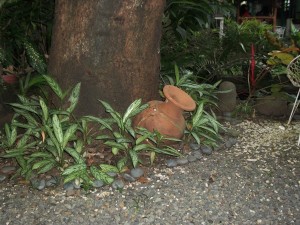Oct 21., 2012 / Homilies
The Kingdom of God
[dropcap style=”font-size: 16px; color: #745cb2;”] This homily was given by Fr. Arnel Aquino, SJ in the Cenacle on the Gospel according to Mark 10: 35-45 (Twenty-ninth Sunday in Ordinary Time).[/dropcap]
 On my last year in Boston, a friend of mine, Fr Joe Bagetta, invited me to give a Lenten talk to parishioners of Boston Cathedral. Back in the day, people refered to Boston as “Catholic Boston” because all through the 19th century, Catholics made up the largest religious community in the city. Fr. Joe welcomed me into the sitting room of the cardinal’s residence while we waited for the parishioners to fill in the church downstairs. I was just a few doors down from Cardinal Sean O’Malley’s office. It was an old sitting room; wooden panels, heavy red velvet curtains, a matching wine-red rug, and the smell of old mansions. On the walls of the room hung larger-than-life oil portraits of cardinals past, shepherds of the Boston flock, the kind that you see in haunted mansions in the movies.
On my last year in Boston, a friend of mine, Fr Joe Bagetta, invited me to give a Lenten talk to parishioners of Boston Cathedral. Back in the day, people refered to Boston as “Catholic Boston” because all through the 19th century, Catholics made up the largest religious community in the city. Fr. Joe welcomed me into the sitting room of the cardinal’s residence while we waited for the parishioners to fill in the church downstairs. I was just a few doors down from Cardinal Sean O’Malley’s office. It was an old sitting room; wooden panels, heavy red velvet curtains, a matching wine-red rug, and the smell of old mansions. On the walls of the room hung larger-than-life oil portraits of cardinals past, shepherds of the Boston flock, the kind that you see in haunted mansions in the movies.
The portraits were very beautiful up close, especially how their eyes were painted, and how the brush captured the grain of their priestly vestments. I guess portraits like these were supposed to coax out of you, a breath of awe. It certainly did out of me. You wouldn’t miss the regality about them: gold-threaded vestments, dainty lace around the cuffs, the velour of the miter, the shine of lacquer on the throne-like chair, the rings of gold accentuating hands that never seem to have done laundry or chopped wood. The cardinals were now mute, Yet every portrait whispered of the power and affluence that came with the position of shepherd of the Church; really fit for royalty, fit for a king in a king-dom.
In fact, I was thinking that afternoon, if the apostles were with me in that sitting room, they’d probably have asked, “Where are we?” “It’s the Cardinal’s sitting room,” I would answer. Maybe they’d ask, “What’s a cardinal?” And I’d be hard put at explaining that to them, especially to try to connect cardinals with the apostolic line (?) which is their line? Maybe I can start: “Well, cardinals are descended from you, guys.” And it would probably blow their minds. Some of them might even say, “Wait, it has all come to this, what we started?” And I’d know what they mean. Because Jesus taught them about the kingdom of God, but not this kind, I suppose. They’d probably be mystified that what before was a kingdom of fishermen, tax collectors, the blind, the lame, the hungry, the widows…had now become very similar to the kingdom of…well…Caesar and Roman centurions and thrones, goblets, jeweled rings, velvet capes, subjects. In other words, we would think that the apostles would be nonplussed at all this royalty, wouldn’t we? They’d never have ambitioned for this kind of a kingdom, would they?
But today’s gospel says that at least two apostles did have the wrong notion of the kingdom: James and John, the sons of Zebedee. “Teacher, we want you to do for us whatever we ask of you. Grant that in your glory, we sit one at your right and at your left.” And that’s getting the Kingdom all wrong. For it bears no difference from the kingdoms of the world—kingdoms with a throne on which a potentate sits, and on two sides of him, trusted advisers whose whispers carry sway. The worst thing about it? It was Jesus’ apostles themselves who did not get the point of the Kingdom of God, which meant that they still did not get Jesus, what he was all about.
We are all prone to that, are we not? Self-entitlement. Self-entitlement is a very gradual slope. In self-entitlement, we steadily go from being thankful for blessings freely given us, to being demanding of blessings we now believe are due us. We go from grateful undeserving recipients of gifts, to begrudging strikers for our rights to them. We go from saying, “Who am I (to deserve this grace)?” to saying, “Do you know who I am (and my right to this grace)?” Whereas before God was giver; now, God is ower. In self-entitlement, mas pinapansin na natin kung anong ipinagkakait, imbis na mas ipagpasalamat natin kung ano ang ipinagkakaloob.
Yet, look at the servant of God as the first reading characterizes him. God says, “My servant gives his life as an offering for sin,” not demand it as though owed him. “Through his suffering, my servant shall justify many, their guilt he shall bear.” The servant of God walks off as a scapegoat of sinners, not a chancellor of kings. In the second reading, Paul says that the great high priest “is able to sympathize with our weaknesses because he has been similarly tested in every way,” instead of demanding to be exempt. In other words, if there’s anyone truly entitled to the share of glory and honor in God’s kingdom, it should be Jesus himself. Yet he privileged himself nothing. Everything that he enjoyed, even his power, he saw as the Father’s gift. When the ungrateful crushed him under the weight of a cross, his last breath was still never a claim, but a surrender.
“You know that the rulers over the Gentiles lord it over them, and their great ones make their authority over them felt. It shall not be so among you. Whoever wishes to be great among you will be your servant; whoever wishes to be first…will be the slave of all.” Jesus paints a portrait of true greatness, doesn’t he? Notice: there is no royal velvet in that portrait, no shimmer of gold, no throne, no royal estate. Yet, that is what kingship is all about in the kingdom of God: faded white tunic, sweaty brow, rough hands, folded knees that draw the body down to towards the earth where the feet of friends might be washed, and a beautiful, warm smile in his eyes that look up at you and say, “Allow me. Entitle me to be your servant.”
Ad majorem + Dei gloriam!










LEAVE A REPLY